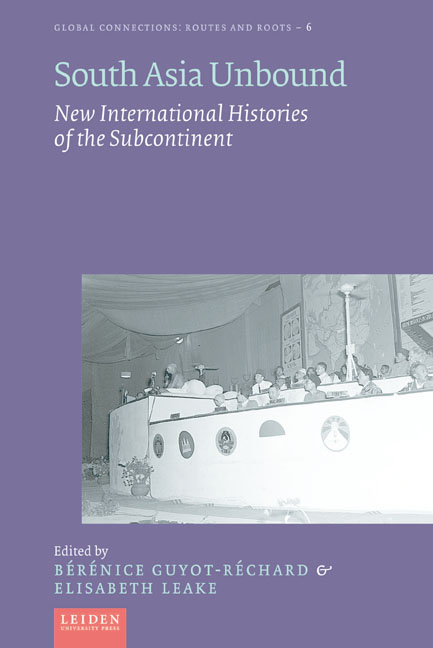Book contents
- Frontmatter
- Contents
- List of Illustrations
- List of Contributors
- Acknowledgements
- Acronyms and Abbreviations
- Introduction. South Asia Unbound
- Part I (Inter)national Orders and State Futures
- Part II From the Transimperial to the International: Lived Uncertainties
- Part III South Asian Roots of the International
- Part IV Ambivalences and Sensibilities of Internationalism
- Afterword
- Index
Part III - South Asian Roots of the International
Published online by Cambridge University Press: 04 January 2025
- Frontmatter
- Contents
- List of Illustrations
- List of Contributors
- Acknowledgements
- Acronyms and Abbreviations
- Introduction. South Asia Unbound
- Part I (Inter)national Orders and State Futures
- Part II From the Transimperial to the International: Lived Uncertainties
- Part III South Asian Roots of the International
- Part IV Ambivalences and Sensibilities of Internationalism
- Afterword
- Index
Summary
For many South Asian elites and intellectuals, international engagement was not something forced upon the subcontinent by the advent of colonial rule. Rather, South Asia offered diverse prototypes for global exchange and mobilization, and South Asians could – and did – take the lead in promoting alternative forms of internationalism. This section traces three different lineages of South Asian internationalism, each of which were rooted in the history and practices of the subcontinent.
Yorim Spoelder traces the movements and evolving ideas of Kalidas Nag, the founder of the Greater India Society who traveled the world between the two world wars. Nag's outlook was simultaneously global and local. While he advocated for global humanism as a means of avoiding another catastrophic world war, he linked this intellectual project to a rewriting of history that gave India the leading role in “discovering” the Pacific in the Age of Exploration. He thus positioned India, rather than Europe, at the head of both past and present global orders. Moving into the era of Afro-Asian decolonization, Carolien Stolte reveals how the transnational organization, the World Peace Brigade, had its roots in personal relationships established at the Gandhigram ashram near Dindigul, in southern India. The movement, which sought to promote peace against the backdrop of a nuclear Cold War, derived both ideas and practices from Gandhian models of nonviolence. However, it increasingly came up against the imperatives of newly independent states more interested in establishing their sovereignty. Lastly, Simon Wolfgang Fuchs explores the history of Pakistan's Jamaat-i Islami, the political party established by the prominent Muslim thinker, Abu l’-A’la Mawdudi. Jamaat, like Mawdudi, sought both national and international revolutions deriving from the sociopolitical power of Islam. They linked this political project to South Asia's much longer history of pan-Islamic mobilization, questioning the assumed central importance of the Middle East.
In all these cases, South Asian internationalists argued that the subcontinent should take a leading role in shaping the world order, citing its history and diverse ideological lineages. But they also wrestled, often unsuccessfully, with the fraught relationship between nationalism and internationalism, struggling to create systems or networks that could comfortably accommodate both universalist ideas and nation-state practices.
- Type
- Chapter
- Information
- South Asia UnboundNew International Histories of the Subcontinent, pp. 165 - 166Publisher: Amsterdam University PressPrint publication year: 2023

